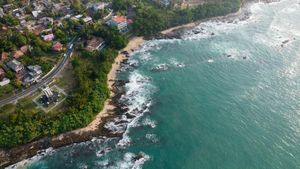RUSSIA HAS LAUNCHED A NEW REGISTRY FOR CONTROLLED INDIVIDUALS TARGETING ILLEGAL MIGRANTS
New measure aims to streamline expulsion procedures and restrict rights of undocumented foreigners.
Russia has implemented significant changes to its immigration policy with the introduction of a new registry for controlled individuals, effective February 5, 2025. This registry is set to include foreign nationals who are illegally residing within the country, providing authorities a streamlined method for managing cases of undocumented migrants and expediting their expulsion.
According to Alexander Rechytsky, the police chief of Krasnoyarsk Krai, "Since February 5, the approach to organizing control over migration processes has drastically changed, starting the functioning of the registry of controlled individuals, as well as the introduction of expulsion procedures for migrants illegally present in the Russian Federation." This approach significantly alters how the government controls immigration and upholds public safety, reflecting Russia’s growing concerns over illegal migration.
The registry currently includes over 640,000 foreign citizens who have violated their immigration statuses, with approximately 6,500 identified within the Krasnoyarsk region alone. Migrants placed on this list will face significant restrictions on their rights, limiting their ability to engage with many normal societal functions. For example, they will be banned from getting married, enrolling children in kindergartens or schools, as well as obtaining driver's licenses, or even managing bank accounts.
Employers, citizens, and various state institutions can now verify the status of foreign nationals through access to this registry, which is updated four times daily. Rechytsky pointed out, "The necessary information from the registry of controlled individuals will be available through the unified system of interdepartmental electronic interaction…" allowing for increased oversight and compliance checks.
One of the more controversial elements of this new policy is the ability of police to make independent decisions on expulsion without court intervention. Previously, the authority to deport undocumented migrants solely rested with the judicial system. Now, as emphasized by Vyacheslav Volodin, the Speaker of the State Duma, "Now, police can independently decide on the expulsion of foreigners, whereas before it was solely the courts' authority.” This shift can lead to quicker removals from the country but also raises concerns about potential abuses of power.
For the migrants themselves, the new regulations could result in confusion and fear. Many individuals who find themselves on this list may not fully understand the ramifications of their status, as voiced by community leaders such as Abdusalam Sharipov from the Kyrgyz diaspora. He noted, "Migrants, naturally, are not aware because this information should be communicated before entering Russia." There’s growing anxiety among migrants about the potential risks of being labeled within such registries, leading many to reconsider their decisions to travel to Russia.
The penalties for being on the registry are severe. Migrants can face expulsion back to their home countries, and numerous new laws enacted have collectively aimed at tightening Russia's immigration controls over the past year. By publicizing the information via government channels, authorities believe it will encourage compliance and proper documentation among foreign nationals.
The governmental websites and the Unified State Services portal offer tools for anyone wishing to check the status of undocumented migrants. Here, individuals can input specific information to see if someone is registered within the controlled individuals registry. This transparency might assist legitimate foreign workers but simultaneously increases the scrutiny faced by those who may have simply overstayed their visas.
With the complexity of the new rules settling among the foreign communities and employers, the impact on the workforce can be seen already. Business owners like Kirill Aksenov, who runs a construction service, noted, "We have increasingly employed workers from regions within Russia, rather than relying on migrant labor. This trend of changes will compel businesses to adapt to stricter regulations, without compromising their staffing needs.”
The initial phases post-implementation indicate mixed acceptance. While some migrants are reconsidering their presence, others who comply with regulations may find themselves unaffected by the changes. Volodin expressed the necessity for continuous improvement of migration policies stating, "It is important to improve the migration policy area, to fully restore order." The government's desire to create uniformity and legality within the workforce is aimed at ensuring fair conditions for all parties involved, both locals and migrants.
Overall, Russia’s new registry for controlled individuals marks a definitive shift toward more stringent immigration processes aimed to keep tight control over illegal migration. While the intent is to strengthen the sovereignty of the country, the repercussions for numerous individuals could pose challenges for their legal standings and daily lives.



